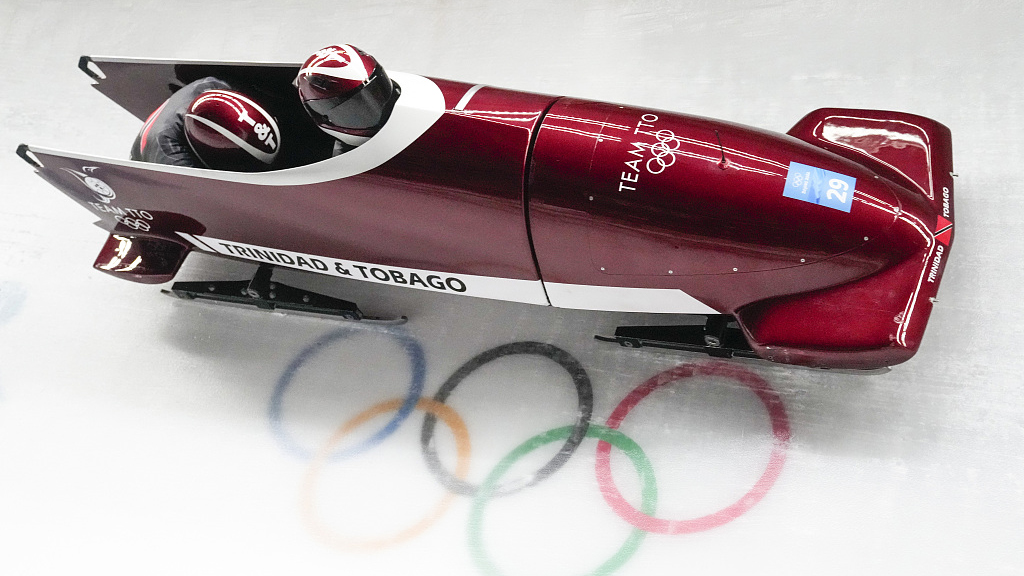
Axel Brown and Andre Marcano of Trinidad and Tobago compete in heat 1 of the two-man bobsleigh at the Beijing 2022 Winter Olympics in Yanqing District, Beijing, China, February 14, 2022. /CFP
Axel Brown and Andre Marcano of Trinidad and Tobago compete in heat 1 of the two-man bobsleigh at the Beijing 2022 Winter Olympics in Yanqing District, Beijing, China, February 14, 2022. /CFP
As champions rake in the medals at the Beijing 2022 Winter Olympics, some athletes have stood out for a different reason: for representing countries not usually known as winter sports hubs.
From Thailand to Mexico via Eritrea and Haiti, around 90 national Olympic committees (NOCs) have athletes taking part in these Games.
But while relishing the honor of representing their country on the world's biggest sports stage, many have had to overcome major hurdles to be here.
"The funding is always an issue when you're representing a small country in winter sports, so of course it is a bit of a struggle," Irish cross-country skier Thomas Maloney Westgaard told CGTN after the men's skiathlon race.
"But you do your main thing and that's the training and you hope to get better every day. So that's the dream really, to bring Ireland up there."
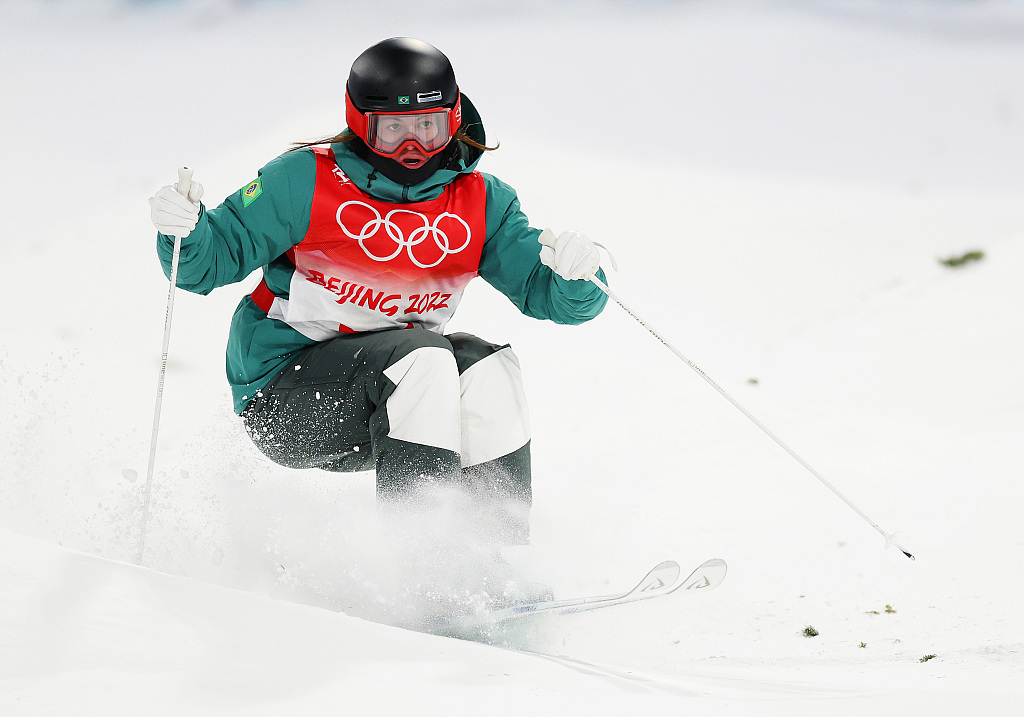
Sabrina Cass of Brazil during the women's freestyle skiing moguls qualification at the Beijing 2022 Winter Olympic Games at Genting Snow Park in Zhangjiakou, China, February 6, 2022. /CFP
Sabrina Cass of Brazil during the women's freestyle skiing moguls qualification at the Beijing 2022 Winter Olympic Games at Genting Snow Park in Zhangjiakou, China, February 6, 2022. /CFP
Westgaard has dual Norwegian and Irish citizenship, speaks Norwegian and trains in Norway, but opted to compete for Eire. And when he speaks English, it is with an accent that is halfway between Norwegian and Irish.
"I'm extremely proud of representing Ireland. I know we're a small team but I do everything I can to get Ireland up there, I work hard every day to make that dream come true."
A lack of infrastructure
Freestyle skier Dominique Ohaco of Chile cut a rare figure on Monday in the qualifying round for the women's slopestyle competition, dominated by European, North American and Chinese athletes.
"It's actually an honor to be here and not only represent Chile, I'm representing all South America. I'm the only athlete from South America in this sport so it's awesome to be able to be here and represent everyone."
"We don't have many athletes coming to the Olympics so it's only a few of us who are getting funded to be here but I'm very lucky because I have very good support from the Chilean Olympic Committee," she noted.
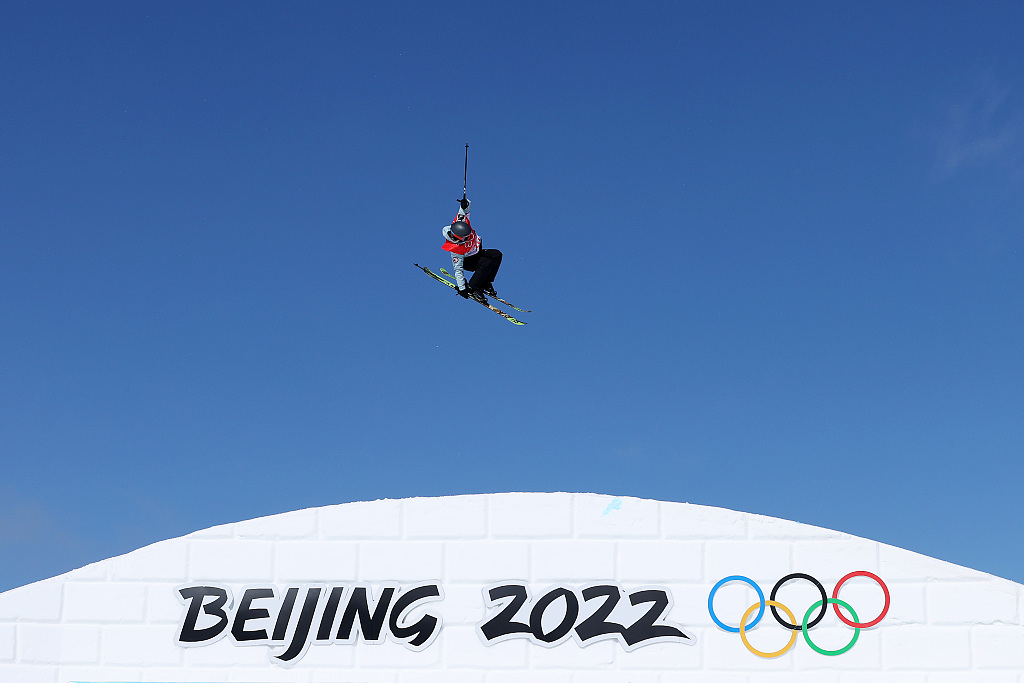
Dominique Ohaco of Chile performs a trick during the women's freestyle skiing slopestyle qualification at the Beijing 2022 Winter Olympics at Genting Snow Park in Zhangjiakou, China, February 14, 2022. /CFP
Dominique Ohaco of Chile performs a trick during the women's freestyle skiing slopestyle qualification at the Beijing 2022 Winter Olympics at Genting Snow Park in Zhangjiakou, China, February 14, 2022. /CFP
Unfortunately, in countries without a long winter sports tradition, limited visibility and limited investment impacts not only current athletes but also kids hoping to follow in their footsteps.
"When I was a kid I trained in Chile and I learned almost everything there," said Ohaco.
"(But) now with all the new facilities everywhere in the world, it's very difficult for a kid from South America to be at the same level (of) training when they are kids. So it's very difficult."
Between training and competitions, she admitted "I actually don't spend much time in Chile right now, these past few years."
"But I hope we can keep improving and hopefully have another South American person coming after me to this beautiful event."
Speed skater Laura Gomez of Colombia echoed Ohaco's words, telling the Olympic Information Service (OIS): "We are trying to get more people, but as a tropical country it's really hard because you have to go out of Colombia to try to do it."
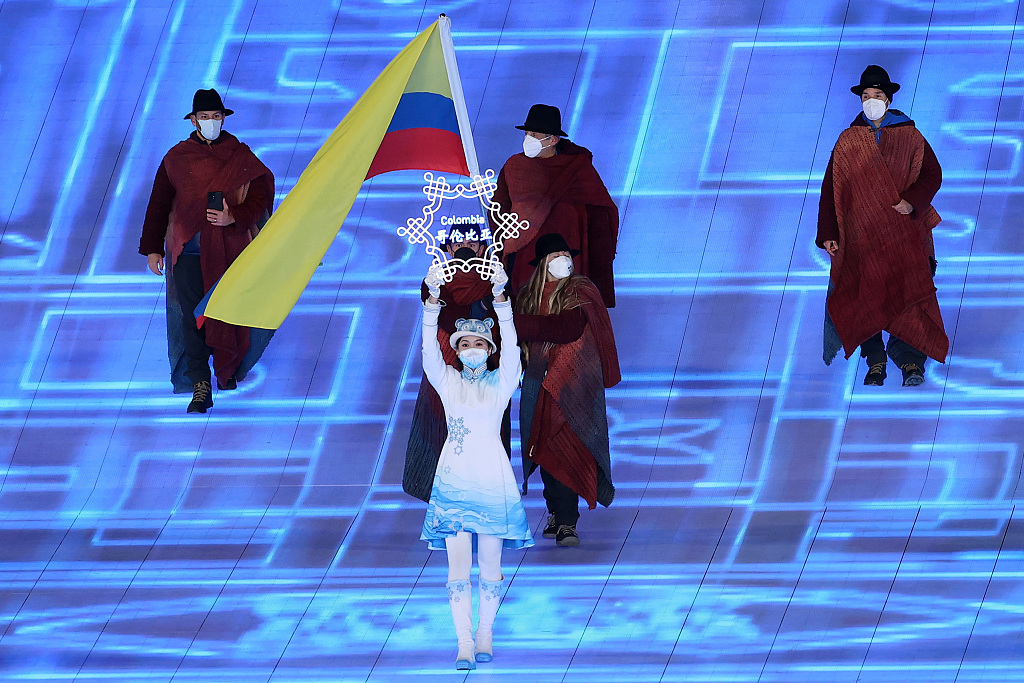
Team Colombia takes part in the parade of nations during the opening ceremony of the Beijing 2022 Winter Olympics at the Beijing National Stadium in Beijing, China, February 4, 2022. /CFP
Team Colombia takes part in the parade of nations during the opening ceremony of the Beijing 2022 Winter Olympics at the Beijing National Stadium in Beijing, China, February 4, 2022. /CFP
"Now the team are in the U.S., some people are in Canada. It's really expensive for us, so probably that's why we are not too (many) people. Hopefully for the future, more people are joining the team. For sure I would like to see more than just one (Colombian) skating in the Olympic Games."
One-man shows vs powerhouses
Countries like Switzerland, Austria, France or Norway pour enormous funds into winter sports and reap the benefits, regularly topping the Olympic medals table at Winter Games.
Alpine skier Carlos Maeder was adopted as a baby and grew up in Switzerland but he chose to represent his birth country Ghana at the Beijing 2022 Winter Olympics and as such hasn't had the kind of support and help that Swiss ski stars like Beat Feuz or Lara Gut-Behrami can count on.
"I am still a one-man show, I have never had a federation in the back or a personal coach," he told OIS.
Maeder decided five years ago on a whim to try to qualify for the Olympics. "It was a lot of work and then the qualification to be here was a pay-off for that work."
Although he did not finish the men's giant slalom on Sunday, "it means a lot to raise the flag for Ghana as a winter sport nation... I hope I can inspire some young guys to follow dreams, work hard and you can achieve something crazy," he said.
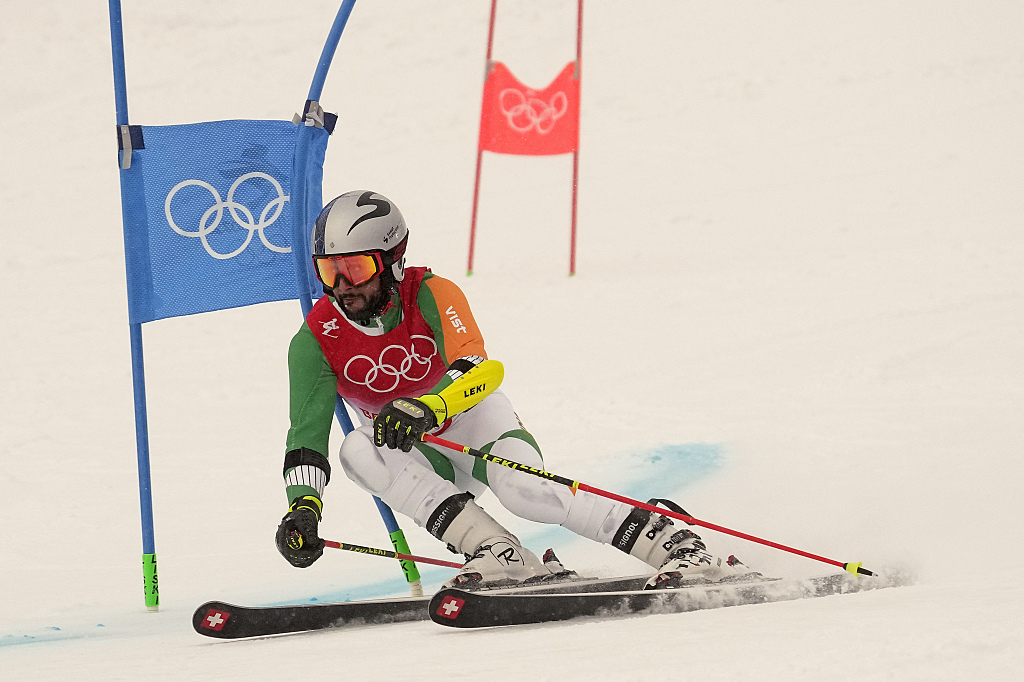
Arif Mohd Khan of India competes in the men's alpine skiing giant slalom at the Beijing 2022 Winter Olympics in Yanqing District, Beijing, China, February 13, 2022. /CFP
Arif Mohd Khan of India competes in the men's alpine skiing giant slalom at the Beijing 2022 Winter Olympics in Yanqing District, Beijing, China, February 13, 2022. /CFP
Caribbean spirit
Probably the most famous story of Olympic underdogs coming from an exotic country is the 1988 Jamaican bobsleigh team that inspired the film "Cool Runnings."
This year, they've been joined by a two-man bobsleigh team from Trinidad and Tobago.
Competing for a small country "is a double-edged sword," pilot Axel Brown told OIS.
"One of the follies of being a small nation is that we have no funding."
"We don't have a physio or anything like that. We're having to share a coach with another nation... We're really on a shoestring budget."
"The other side of that is that what we're doing means so much to so many people, because we're not just a face in the crowd, we're the first people here in 20 years. All of Trinidad's behind us and knows what we're doing."
As he put it, Trinidad and Tobago is "a small nation in a sport that we shouldn't really be competing in – an ice sport, when we're a tropical country."
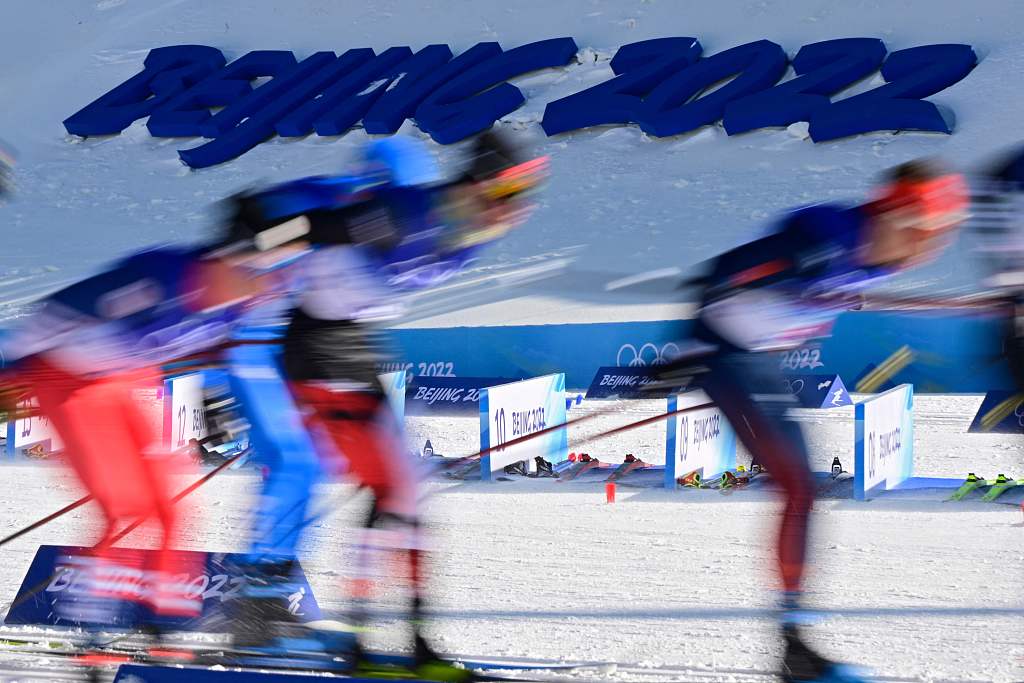
Athletes compete in the men's cross-country 15km + 15km skiathlon at the Beijing 2022 Winter Olympics in Zhangjiakou, China, February 6, 2022. /CFP
Athletes compete in the men's cross-country 15km + 15km skiathlon at the Beijing 2022 Winter Olympics in Zhangjiakou, China, February 6, 2022. /CFP
"Obviously we can't control what these huge nations with millions of dollars of funding can do," he said, illustrating the gulf between winter sports powerhouses and small countries like his.
"But we're here, we're smiling and we're making it happen."
For these athletes, just the fact that they are at the Olympics, even as underdogs, is reason enough to celebrate.
"(In) our country, it is not very common to have a ski team but we are working, and year by year our team is a little bit better and I think that in some years we can be fighting with the best," Brazilian cross-country skier Manex Silva told CGTN after racing with the likes of Alexander Bolshunov and Johannes Hoesflot Klaebo in Zhangjiakou.
"For me now the expectations are to live the experience and to be motivated to continue training and working hard."
Asked if Brazil might win an Olympic medal in cross-country one day, he grinned: "It's very very difficult but why not, in some years!"
(Reporting from Zhangjiakou)

